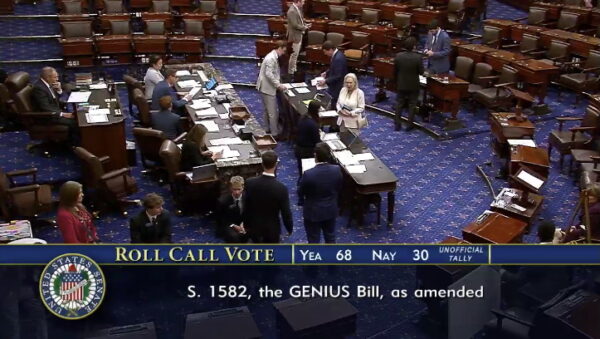The GENIUS Act (S. 1582) was approved by the Senate today, thus moving federal regulations for stablecoins closer to reality.
While stablecoins are typically tied to other assets, such as fiat currency, gold, or perhaps an algorithm, this legislation explicitly addresses payment stablecoins or digital dollars issued by private firms. The passage of the bill has been widely anticipated as Democratic opposition crumbled and additional amendments were added to mollify those who were hesitant.
The final vote was 68 for and 30 against, garnering solid bipartisan support.
One of the biggest supporters, Senator Christie Lummis, commented on the passage of the bill:
“The Senate took a critical step toward securing U.S. Dollar dominance by passing the bipartisan GENIUS Act. I look forward to working with my colleagues on comprehensive market structure legislation to protect consumers & ensure America’s place as the crypto capital of the world.”
Senator Bill Hagerty, the sponsor of the bill, shared a thread on X claiming the US is one step closer to becoming the crypto hub of the world:
“The GENIUS Act establishes the first ever pro-growth regulatory framework for payment stablecoins. This bill will cement US dollar dominance, protect customers, increase demand for US treasuries, and ensure that innovation in the digital asset space is in the hands of the United States of America, not our adversaries.”
 Senator Hagerty predicted that stablecoin issuers could become the world’s largest holders of U.S. Treasuries by 2030, thus buttressing the status of the dollar as the world’s reserve currency.
Senator Hagerty predicted that stablecoin issuers could become the world’s largest holders of U.S. Treasuries by 2030, thus buttressing the status of the dollar as the world’s reserve currency.
Perhaps the biggest immediate beneficiary was Circle (NASDAQ:CRCL), a stablecoin enabler, as its shares have risen dramatically since its IPO earlier this month, fueled in part by expectations for stablecoin legislation.
Dante Desporte, Chief Strategy Officer and Head of Global Policy at Circle, said the passage of the GENIUS Act was a historic moment for the future of money.
“We commend Senators on both sides of the aisle for working together to craft pragmatic, bipartisan legislation that supports innovation while protecting consumers and preserving the strength of the U.S. dollar in the digital age. Since 2021, Senate and House committees have held extensive hearings and markups on stablecoin legislation, and the GENIUS Act is the product of those deliberations. We urge the House to act without delay and send this critical bill to the President’s desk so it can become law.”
Secretary of the Treasury Scott Bessent said the legislation was a win-win for everyone.
“Recent reporting projects that stablecoins could grow into a $3.7 trillion market by the end of the decade. That scenario becomes more likely with [the] passage of the GENIUS Act. A thriving stablecoin ecosystem will drive demand from the private sector for US Treasuries, which back stablecoins. This newfound demand could lower government borrowing costs and help rein in the national debt. It could also onramp millions of new users—across the globe—to the dollar-based digital asset economy.”
Bessent said the bill was smart, pro-innovation legislation.
Next up is the House, which has its own stablecoin legislation in the works. Once this is done, it will be sent to the President’s desk to be signed into law.


